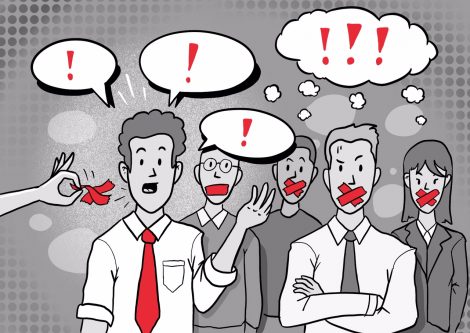When employees (don’t) speak up

Teams can achieve especially good results when all members contribute their ideas, perspectives or concerns. Oftentimes, however, members keep relevant information and observations to themselves. When do employees communicate problems and suggestions, and what are the consequences?
In the context of New Work people are encouraged to celebrate their mistakes at Fuck up nights, share their opinions regardless of hierarchies according to Radical Honesty and constantly question and optimise the status quo considering users’ needs. Nonetheless, there are countless examples of crises and catastrophes caused by employees failing to remark mistakes, problems or observations of illegal or unethical activities. When do employees decide to contribute their ideas and concerns and when do they consciously withhold them?
Employee voice behaviour prevents crises
This is the focus of research on employee voice behaviour. The term describes the communication of suggestions or criticism to people who could improve the situation (Morrison, 2014). The intention behind this communication is constructive and aims at changing the status quo. Employee voice behaviour has a positive effect on processes and effectiveness in organisations and teams and prevents crises. People who actively contribute their ideas and suggestions for improvement are perceived as more innovative and progress faster in their career. Nevertheless, oftentimes employees see inappropriate activities, opportunities for improvement or ineffective processes but withhold relevant information or do not share their observations with people who could change these conditions (Detert & Edmondson, 2011). This negatively affects the quality of decision-making, work ethic and performance in teams.
Speaking up with concerns or suggesting ways of improvement?
Research shows that employees share suggestions or observations with relevant people depending on whether they perceive the communication to be effective and safe (Morrison, 2014). They are more likely to keep their ideas to themselves if they feel that communicating them would not lead to the desired change or that the communication could have a negative effect on them or others. According to a recent meta-analysis, there is some truth to these concerns (Chamberlin, Newton & Lepine, 2017). The researchers distinguished between promotive voice behaviour (the communication of suggestions and opportunities to improve the organisation) and prohibitive voice behaviour (the communication of concerns and problems in order to avert negative consequences for the organisation). The analysis of 25 studies showed that the performance of people with strong promotive voice behaviour was assessed positively, while people with strong prohibitive voice behaviour received negative performance assessments. In other words, employees were rewarded when they contributed ideas for improvement and punished when they tried to prevent harm.
Oftentimes, employees direct their suggestions to managers, because managers can most likely change the situation. Instead of appreciating suggestions from employees and addressing the problems, managers often react defensively or do not take the remarks seriously. Reasons for this includes that the communication of problems, weaknesses and inappropriate activities is particularly threatening to others, causes negative emotions and strains interpersonal relationships (Morrison, 2014). Employees are quickly labelled as naggers or troublemakers. Many managers are also unaware that employees may not communicate relevant information or observations because they feel uncomfortable communicating with them. Moreover, managers often do not ask their team for impressions or suggestions because they tend to overestimate their competencies and the quality of their decision making (Ashford et al., 2009).
Starting points for leaders to motivate employees to speak up
Especially in highly hierarchical working environments, beliefs such as “Don’t admit mistakes” or “Don’t change the status quo” are still strongly anchored in people’s minds. Managers should therefore actively fight against the tendency of employees to withhold unpleasant information. The meta-analysis identifies several actions that help managers to create teams in which all members contribute their ideas and concerns (Chamberlin et al., 2017):
- Hiring people who approach tasks actively and independently and letting them experience that their competencies make a positive contribution
- Delegating responsibility to employees and granting them autonomy
- Continuously working on the quality of individual relationships with employees
- Signalling openness and interest in the suggestions of employees
- Actively asking for and appreciating the perspectives and concerns of employees
- Critically examining their own behaviour, admitting mistakes and recognising the value of changes in the status quo
- Increasing psychological safety in the team (i.e. establishing a climate in which people can make suggestions and raise concerns without fear of negative consequences)
Obviously, employees are also encouraged to communicate relevant suggestions and concerns more strongly. To avoid a poorer performance rating, they should always bring in problems together with constructive suggestions for solutions, signal their support in dealing with the problems and avoid directly attacking others.
Sources:

